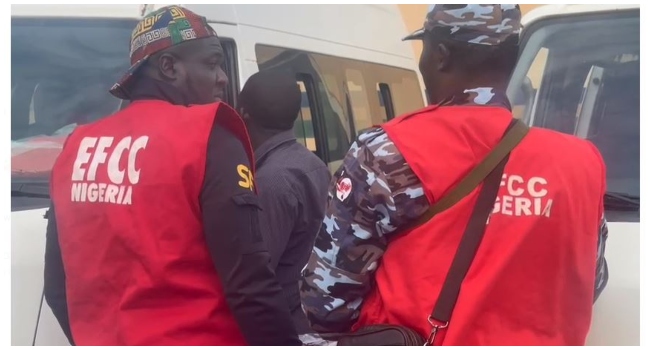Table of Contents
The investigation into the sleaze in the Ministry of Humanitarian Affairs and Poverty Alleviation deepened on Wednesday, with the Economic and Financial Crimes Commission investigators quizzing several top civil servants linked to the scandals.
This was as The PUNCH learned that the Independent Corrupt Practices and Other Related Offenses Commission recovered N50 billion from the humanitarian affairs ministry.
The money, which was about to be embezzled, was recovered by the ICPC between July and August 2023 and paid into the Central Bank of Nigeria.
The PUNCH gathered that the fund, which was meant for vulnerable citizens during the tenure of former Minister Sadiya Umar-Farouq, was blocked during attempts to transfer it into private bank accounts and recovered by the ICPC under its former Chairman, Bolaji Owasanoye.
An impeccable government source told our correspondent that the N50 billion was subsequently handed over to the President Bola Tinubu-led Federal Government.
Confirming the development, the source stated, "The funds were recovered when former President Muhammadu Buhari and Umar-Farouq were leaving office and President Tinubu had yet to appoint a new humanitarian affairs minister."
Recovered fund
President Tinubu, upon the appointment of the now-suspended Minister of Humanitarian Affairs, Betta Edu, ordered the Accountant-General of the Federation to refund the money to the ministry as part of the Infrastructure Support Fund for the 36 states and the Federal Capital Territory to cushion the effect of the fuel subsidy removal: "The refunded sum is part of the N44bn allegedly laundered in the National Social Investment Programme Agency and the N585m Edu authorized for disbursement." Shedding more light on the interception and recovery of the fund, another source explained, During the naira scarcity between late 2022 and 2023, the ICPC under Prof. Owasanoye blocked and recovered the sum of N50bn from the Ministry of Humanitarian Affairs.
The first sum that was blocked and recovered was N32bn, but when the commission probed further, another N18bn was blocked and recovered from the ministry. The ICPC discovered that the money was meant for the vulnerable and poor people in the country, which the ministry under the former minister, Umar-Farouq, could not distribute due to the scarcity of currency during the naira redesign period.
The money was paid into the coffers of the government between July and August 2023. Some officials in the ministry attempted to disburse the funds into private accounts when the former minister was no longer active in office and there was no new minister last year. The ICPC immediately blocked the money after discovering the suspicious and fraudulent manner in which it was to be distributed, and it was recovered.
After President Tinubu announced the Infrastructure Support Fund for the 36 states and the Federal Capital Territory to cushion the effect of the fuel subsidy removal, the Federal Government paid the money into the coffers of the Humanitarian Affairs Ministry under Betta Edu, the ministry in charge of poverty alleviation projects.
Civil servants quizzed
In continuation of their probe, EFCC detectives questioned many senior civil servants in the humanitarian affairs ministry on Wednesday.
Though the details of the officials were sketchy, our correspondent was reliably informed that they gave the investigators useful information that could help them unravel the financial malfeasance in the ministry.
The investigators also held sessions with the suspended Minister of Humanitarian Affairs and Poverty Alleviation, Betta Edu, ex-minister Sadiya Umar-Farouq, and Halima Shehu, the suspended National Coordinator and CEO of the National Social Investment Programme, an agency under the humanitarian ministry.
While Edu is being investigated for authorizing the transfer of N585m into the private account of an accountant in the ministry, Bridget Oniyelu, Umar-Farouq, who served as a minister under former President Muhammadu Buhari, was under the spotlight over alleged N37 billion in money laundering.
Shehu, on the other hand,, was being questioned for allegedly moving N44 billion in NSIP funds into some private and corporate accounts without presidential approval.
An EFCC source stated that the women came today (Wednesday) and they're cooperating with the commission, also, director-generals and other senior officials under the Ministry of Humanitarian Affairs have been and are still being interrogated by the EFCC. Senior officials of some banks are still answering questions over the alleged money laundering.''

